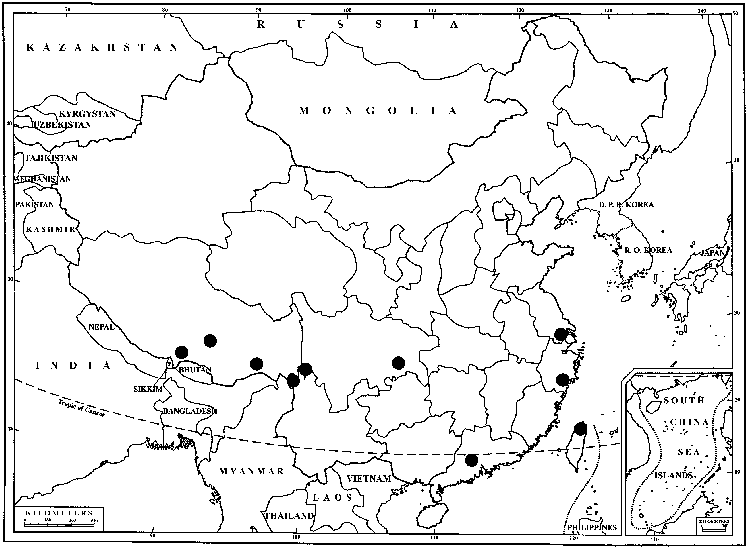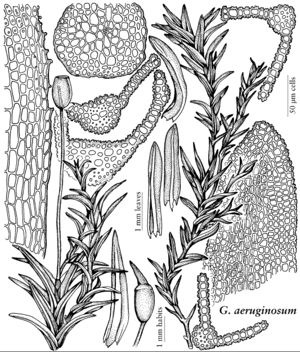Gymnostomum aeruginosum
Fl. Brit. 3: 1163. 1804,.
Plants light to dark green, cespitose, crowded or rarely forming a dense turf. Cauline leaves long-rectangular or long-elliptical to broadly lanceolate, straight to strongly reflexed, 0.5–2 mm, apex rounded to broadly acute, occasionally apiculate; distal cells sometimes 2-stratose marginally in patches or entirely and also medially in patches, distal laminal cells 7–13 µm in width, 1:1; costa subpercurrent to percurrent. Specialized asexual reproduction absent. Perichaetia single on an elongate axis, terminating the axis; perichaetial leaves loose and flexuose, ligulate to ovate-lanceolate, little sheathing at base, basal cells rectangular, smooth, distal laminal cells quadrate, strongly papillose. Capsule long- or rarely short-cylindric, wide-mouthed, with flat or weakly convex exothecial cells, these usually 20–25(–30) µm wide, though somewhat bulging near the neck.
Phenology: Capsules mature summer–fall.
Habitat: Calcareous rock in wet situations, especially near waterfalls, moist gorge walls, rarely soil
Elevation: low to high elevations (0-3000 m)
Distribution

Greenland, Alta., B.C., Man., N.B., Nfld. and Labr. (Nfld.), N.W.T., N.S., Nunavut, Ont., P.E.I., Que., Ala., Alaska, Ariz., Ark., Calif., Colo., Conn., Idaho, Ill., Ind., Iowa, Ky., La., Maine, Mass., Mich., Minn., Mo., Mont., N.Mex., N.Y., N.C., Ohio, Okla., Oreg., Pa., S.Dak., Tenn., Tex., Utah, Vt., Va., Wash., W.Va., Wis., Wyo., Mexico, West Indies, Central America, South America, Eurasia, Africa, Atlantic Islands (Canary Islands), Pacific Islands (New Zealand), Australia.
Discussion
Small forms of Gymnostomum aeruginosum may be similar to G. viridulum in the short-cylindric capsule, but they lack differentiated perichaetial leaves and gemmae. Large forms are occasionally encountered (e.g., Newfoundland, Conception Bay, Brassard 11754, UBC) with a broad, stout excurrent costa to 6 cells across at mid leaf. Gymnostomum aeruginosum differs from Hymenostylium recurvirostrum, a commonly co-occurring calciphilic hygrophyte, in its leaves usually having a long-rectangular shape, being less tapering, the costa commonly subpercurrent with laminal cells crisscrossing beyond the end of the costa, and the capsule dark brown and shining. Also, G. aeruginosum generally has more obscure distal laminal cells, seldom elongate medially in cauline leaves, and the leaf apex is commonly blunt and seldom has an apiculus of a single cell. The adaxial costal cells are elongate in H. recurvirostrum but elongate only in much reduced plants of G. aeruginosum (or other species of the genus).
Selected References
None.
